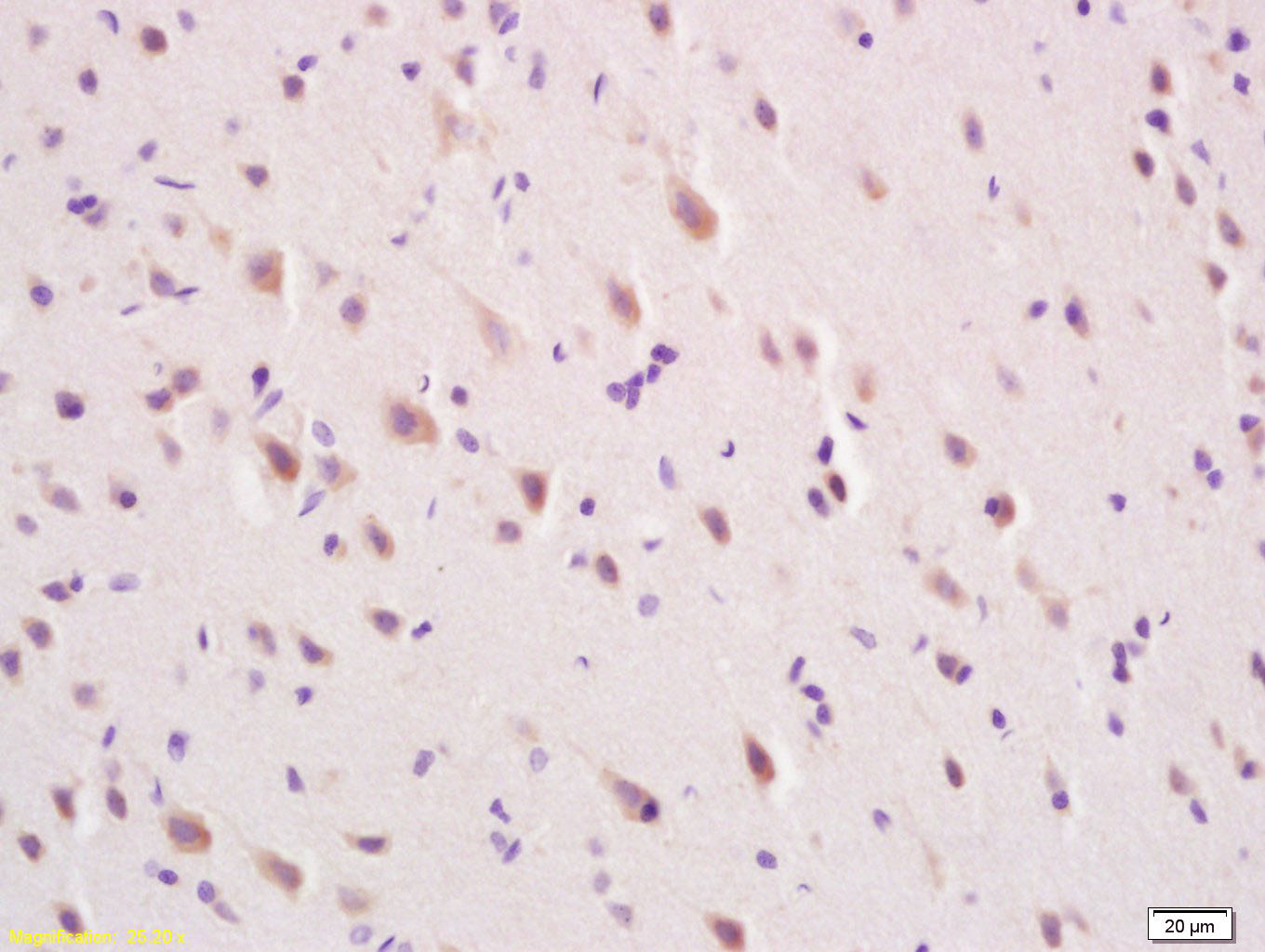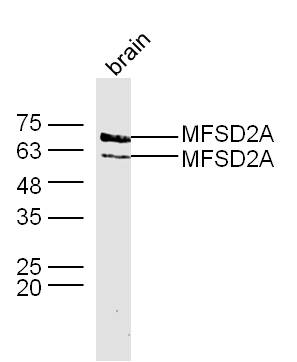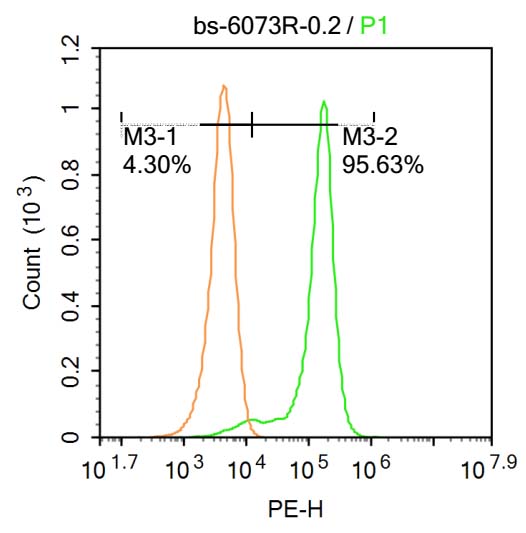MFSD2A Rabbit pAb
Rabbit Polyclonal Antibody
- SPECIFICATION
- CITATIONS
- PROTOCOLS
- BACKGROUND

Application
| WB, IHC-P, IHC-F, IF, FC, E |
|---|---|
| Primary Accession | Q8NA29 |
| Reactivity | Human, Mouse, Rat |
| Predicted | Rabbit, Pig, Chicken |
| Host | Rabbit |
| Clonality | Polyclonal |
| Calculated MW | 60 KDa |
| Physical State | Liquid |
| Immunogen | KLH conjugated synthetic peptide derived from human MFSD2A |
| Epitope Specificity | 331-430/543 |
| Isotype | IgG |
| Purity | affinity purified by Protein A |
| Buffer | 0.01M TBS (pH7.4) with 1% BSA, 0.02% Proclin300 and 50% Glycerol. |
| SUBCELLULAR LOCATION | Endoplasmic reticulum membrane. |
| SIMILARITY | Belongs to the major facilitator superfamily. |
| Important Note | This product as supplied is intended for research use only, not for use in human, therapeutic or diagnostic applications. |
| Background Descriptions | MFSD2 is a 543 amino acid multi-pass membrane protein of the endoplasmic reticulum that is involved in beta-adrenergic signaling during thermogenesis. Existing as three alternatively spliced isoforms, MFSD2 plays a role in G1 regulation and is encoded by a gene that maps to human chromosome 1p34.2. Human chromosome 1 spans 260 million base pairs, contains over 3,000 genes, comprises nearly 8% of the human genome and houses a large number of disease-associated genes, including those that are involved in familial adenomatous polyposis, Stickler syndrome, Parkinson’s disease, Gaucher disease, schizophrenia and Usher syndrome. |
| Gene ID | 84879 |
|---|---|
| Other Names | Major facilitator superfamily domain containing 2; Major facilitator superfamily domain containing 2A; Major facilitator superfamily domain-containing protein 2A; MFS2A_HUMAN; MFSD2; MFSD2A. |
| Dilution | WB 1:500-2000 IHC-P 1:100-500 IHC-F 1:100-500 Flow-Cyt 0.2ug/test IF 1:100-500 ELISA 1:5000-10000 |
| Storage | Store at -20 ℃ for one year. Avoid repeated freeze/thaw cycles. When reconstituted in sterile pH 7.4 0.01M PBS or diluent of antibody the antibody is stable for at least two weeks at 2-4 ℃. |
| Name | MFSD2A {ECO:0000303|PubMed:18694395, ECO:0000312|HGNC:HGNC:25897} |
|---|---|
| Function | Sodium-dependent lysophosphatidylcholine (LPC) symporter, which plays an essential role for blood-brain barrier formation and function (PubMed:24828040, PubMed:32572202, PubMed:34135507). Specifically expressed in endothelium of the blood-brain barrier of micro-vessels and transports LPC into the brain (By similarity). Transport of LPC is essential because it constitutes the major mechanism by which docosahexaenoic acid (DHA), an omega-3 fatty acid that is essential for normal brain growth and cognitive function, enters the brain (PubMed:26005868, PubMed:34135507). Transports LPC carrying long-chain fatty acids such LPC oleate and LPC palmitate with a minimum acyl chain length of 14 carbons (By similarity). Does not transport docosahexaenoic acid in unesterified fatty acid (By similarity). Specifically required for blood-brain barrier formation and function, probably by mediating lipid transport (By similarity). Not required for central nervous system vascular morphogenesis (By similarity). Acts as a transporter for tunicamycin, an inhibitor of asparagine-linked glycosylation (PubMed:21677192). In placenta, acts as a receptor for ERVFRD-1/syncytin-2 and is required for trophoblast fusion (PubMed:18988732, PubMed:23177091). |
| Cellular Location | Cell membrane; Multi-pass membrane protein. Endoplasmic reticulum membrane {ECO:0000250|UniProtKB:Q9DA75}; Multi-pass membrane protein. Note=Cytoplasmic punctae that may represent vesicles shuttling between the endoplasmic reticulum and the plasma membrane (PubMed:21677192). |
| Tissue Location | In placenta, associated with trophoblast cells. |

Thousands of laboratories across the world have published research that depended on the performance of antibodies from Abcepta to advance their research. Check out links to articles that cite our products in major peer-reviewed journals, organized by research category.
info@abcepta.com, and receive a free "I Love Antibodies" mug.
Provided below are standard protocols that you may find useful for product applications.
Background
MFSD2 is a 543 amino acid multi-pass membrane protein of the endoplasmic reticulum that is involved in beta-adrenergic signaling during thermogenesis. Existing as three alternatively spliced isoforms, MFSD2 plays a role in G1 regulation and is encoded by a gene that maps to human chromosome 1p34.2. Human chromosome 1 spans 260 million base pairs, contains over 3,000 genes, comprises nearly 8% of the human genome and houses a large number of disease-associated genes, including those that are involved in familial adenomatous polyposis, Stickler syndrome, Parkinson’s disease, Gaucher disease, schizophrenia and Usher syndrome.
If you have used an Abcepta product and would like to share how it has performed, please click on the "Submit Review" button and provide the requested information. Our staff will examine and post your review and contact you if needed.
If you have any additional inquiries please email technical services at tech@abcepta.com.













 Foundational characteristics of cancer include proliferation, angiogenesis, migration, evasion of apoptosis, and cellular immortality. Find key markers for these cellular processes and antibodies to detect them.
Foundational characteristics of cancer include proliferation, angiogenesis, migration, evasion of apoptosis, and cellular immortality. Find key markers for these cellular processes and antibodies to detect them. The SUMOplot™ Analysis Program predicts and scores sumoylation sites in your protein. SUMOylation is a post-translational modification involved in various cellular processes, such as nuclear-cytosolic transport, transcriptional regulation, apoptosis, protein stability, response to stress, and progression through the cell cycle.
The SUMOplot™ Analysis Program predicts and scores sumoylation sites in your protein. SUMOylation is a post-translational modification involved in various cellular processes, such as nuclear-cytosolic transport, transcriptional regulation, apoptosis, protein stability, response to stress, and progression through the cell cycle. The Autophagy Receptor Motif Plotter predicts and scores autophagy receptor binding sites in your protein. Identifying proteins connected to this pathway is critical to understanding the role of autophagy in physiological as well as pathological processes such as development, differentiation, neurodegenerative diseases, stress, infection, and cancer.
The Autophagy Receptor Motif Plotter predicts and scores autophagy receptor binding sites in your protein. Identifying proteins connected to this pathway is critical to understanding the role of autophagy in physiological as well as pathological processes such as development, differentiation, neurodegenerative diseases, stress, infection, and cancer.




